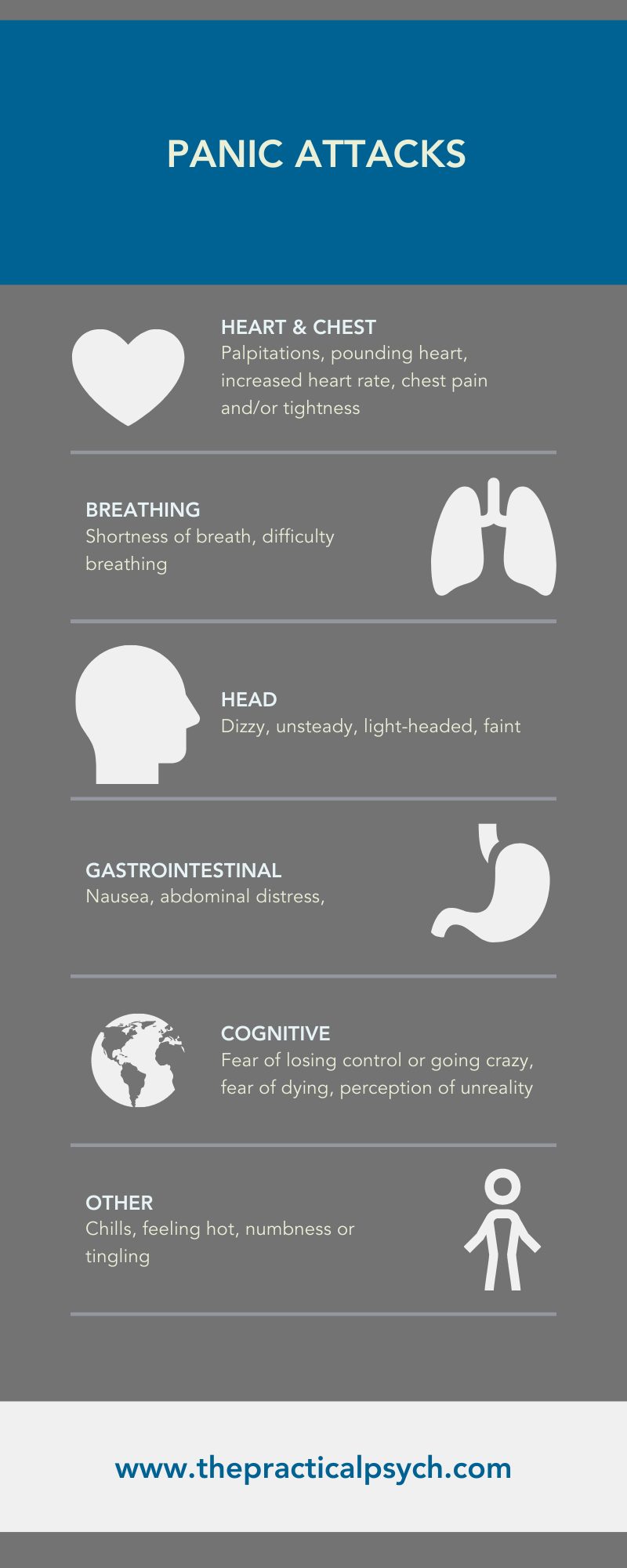What are panic attacks and how are they treated?
Anxiety Attack Help
Many people are interested in panic attacks, and many others experience them. But, there are misconceptions on this topic. I've put together this brief article to give you the basic facts on this common psychological issue.
What is a panic attack?
A panic attack is a sudden burst of intense fear accompanied by several very unpleasant physical symptoms. The peak of this attack is usually reached within seconds to a few minutes. The entire episode is usually over after a few to several minutes, but people can experience 'residual' symptoms for some time afterwards.
A panic attack involves a sense of dread or the assumption that something terrible is happening (such as a heart attack or going crazy). Heart-related symptoms are common (eg., racing heart), as are breathing issues (e.g., shortness of breath). Other panic attack symptoms may also occur, such as sweating, nausea, dizziness, numbness, and tingling sensations (1).
Panic attacks occur with a huge range in frequency. Some might only experience one attack across their lifetime. Others experience daily attacks. 'Panic disorder' is diagnosed when a person experiences multiple attacks, alongside worrying about having further attacks, and making behaviour changes in an attempt to cope with the anxiety.
Panic attacks sometimes lead to the occurrence of agoraphobia which is severe anxiety occurring in situations where escape or receiving help may be difficult should a panic attack be experienced.
Anxiety tremors
Shaking and trembling may occur in a panic attack. This is usually what people are referring to when discussing ‘anxiety tremors’. This phenomenon is also called psychogenic tremor.
Panic attack chest pain
Chest pain and/or tightness are common physical sensations associated with panic attacks. It is important to rule out any underlying cardiac or heart issue, so always see your health physician to ensure that an underlying medical issue is not mistaken for panic.
How long does a panic attack last?
As mentioned above, panic attacks are short-lived, usually lasting no more than a few minutes. However, they can seem to last forever given their very unpleasant nature.
Panic attack vs anxiety attack
The short burst nature of this distress is what distinguishes panic from other forms of anxiety. Sometimes there is a fine line between anxiety and panic. The latter is a specific form of anxiety that has activated the body’s fight/flight (alarm) response. This response is always severe, whereas an anxiety attack occur at a lower level of intensity.
How common are panic attacks?
Approximately 30% of adults have experienced at least one attack, with up to 5% meeting diagnosis requirements for panic disorder (2, 3).
How are panic attacks treated?
There are both medication and psychological treatment options for panic attacks/panic disorder. Medications used generally include drugs that produce a sedative effect and those providing an anti-anxiety effect. Both types of medication can effectively manage panic (4), but side-effects are often encountered (5).
How to stop a panic attack
Cognitive Behaviour Therapy (CBT) is widely recommended as the go-to psychological intervention for panic. This treatment has good efficacy (6). CBT works on the premise that panic attacks are triggered by internal (e.g., noticing heart beating) and external (e.g., going to a medical appointment) factors. Triggers lead to a ‘vicious cycle’ of thoughts, feelings, behaviours and additional physical sensations that cause and maintain panic. The vicious cycle of panic is addressed by teaching several skills which include:
Identifying and managing triggers
Relaxation training
Identifying and challenging panic-related thoughts
Eliminating counterproductive ‘safety behaviours’
Controlled exposure to feared physical sensations.
Panic attack meme
Panic attacks should be taken seriously, but humour can be an effective anxiety management tool in some instances.
Summary
Panic attacks are horrible and frightening. Fortunately, we have some effective treatment options, so there is no need to put up with this problem. Many people suffer from panic attacks on and off for several years. This is a shame because there is no need to suffer for years on end without help.
If you are suffering from panic attacks, seek some help and improve your quality of life.
We are Coaching & Clinical Psychologists with extensive experience helping people conquer a range of wellbeing and performance issues at home and in the workplace. We can also help with panic attacks. Read more about our work, watch practical skills videos or browse other articles. Get in touch anytime.
References
(1) American Psychiatric Association. (2013). Diagnostic and statistical manual of mental disorders (5th ed.). Arlington, VA: Author.
(2) Bandelow et al. (2015). Epidemiology of anxiety disorders in the 21st century. Dialogues in clinical neuroscience, 17(3). 327-335.
(3) Kessler et al. (2006). The epidemiology of panic attacks, panic disorder, and agoraphobia in the National Comorbidity Survey Replication. Archives of General Psychiatry, 63(4), 415-424.
(4) Bandelow et al. (2020). Pharmacotherapy for panic disorder. In N. Simon et al (Eds.). Textbook of anxiety, trauma, and OCD-related disorders (pp. 385-398). Washington: American Psychiatric Association Publishing.
(5) Quagliato et al. (2019). elective serotonin reuptake inhibitors and benzodiazepines in panic disorder: A meta-analysis of common side effects in acute treatment. Journal of Psychopharmacology. 2019;33(11):1340-1351.
(6) Pompoli et al. (2018). Dismantling cognitive-behaviour therapy for panic disorder: a systematic review and component network meta-analysis. Psychological Medicine, 48(12), 1945-1953

